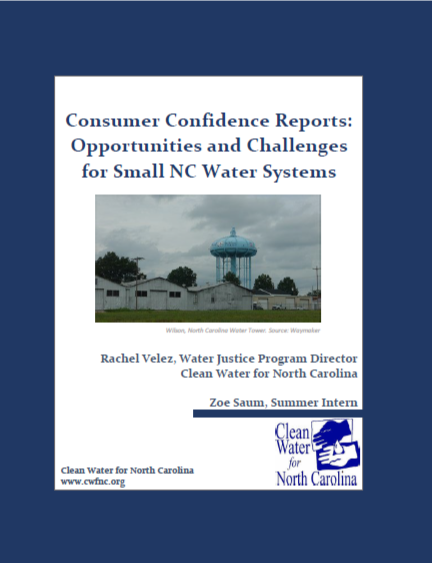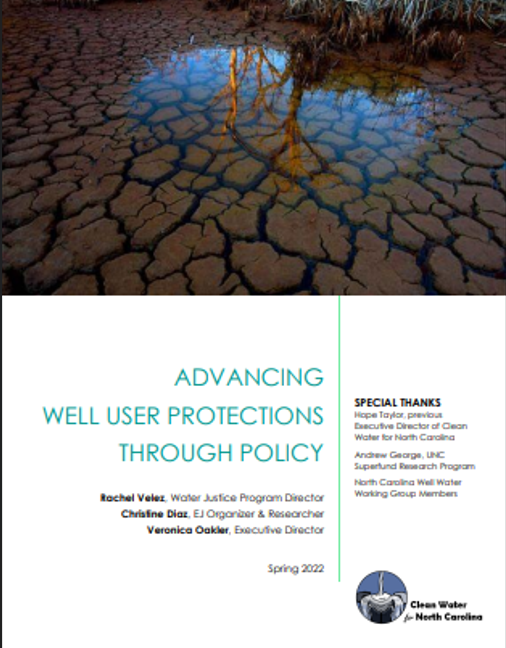Consumer Confidence Reports: Opportunities and Challenges for Small NC Water Systems (2022)
By Rachel Velez & Zoe Saum
This report is intended to provide a unique insight into the perceived challenges and opportunities of publishing effective Consumer Confidence Reports by North Carolina’s smallest water systems. While the scope of this report is considerably small and by no means represents the experiences of all small to mid-sized water systems in the state, we hope that NC DEQ will see this as a starting point to conduct more in-depth research into the challenges faced by relatively understaffed, overburdened, and rural drinking water providers.
Advancing Well User Protections Through Policy (2022)
By Rachel Velez, Christine Diaz, Veronica Oakler
Based on experience from our 35+ years of Well User Protection work, Clean Water for NC staff devised two specific policy recommendations that we believe could increase state officials’ capacity to monitor groundwater, promote health protective measures among private well users, and assist with remediation efforts for private well users with known drinking water contamination.
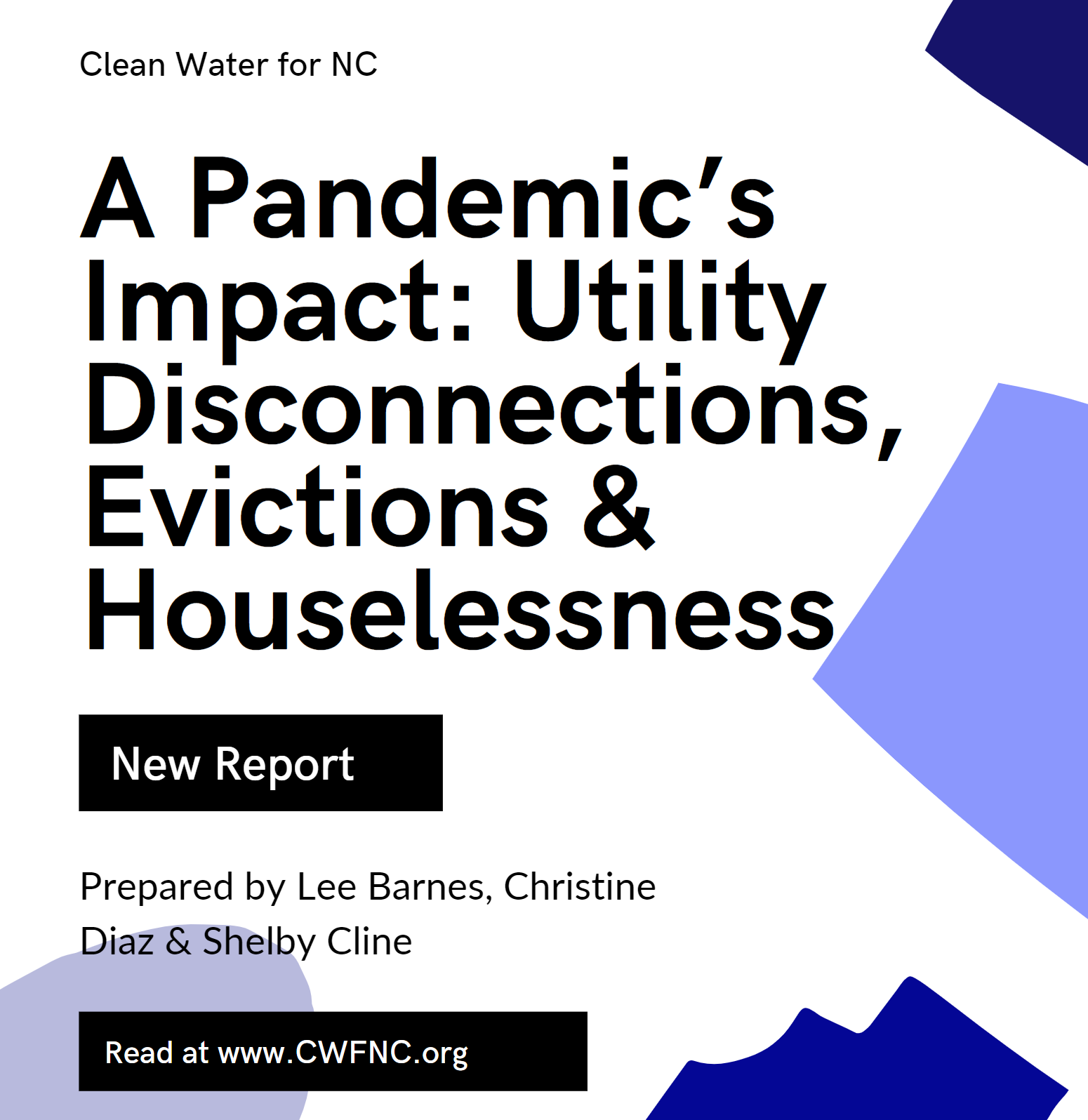
A Pandemic’s Impact: Utility Disconnections, Evictions & Houselessness (2021)
By Lee Barnes, Christine Diaz, Shelby Cline
The COVID-19 Pandemic had significant financial impacts for many families across the US and in North Carolina. Clean Water for NC Staff, along with volunteer Lee Barnes, explored the nuances and impacts of the pandemic on utility insecurity, eviction insecurity, and houselessness in the U.S., and specifically North Carolina, during COVID-19. We also consider the disproportionate impacts on low-income households as well as Black, Indigenous and other communities of color. We hope to highlight resources for those facing these difficulties and groups who are providing assistance as well as demonstrate our commitment to holistically considering issues facing environmental justice communities.
Bird’s Eye View: Impacts of Poultry Production on People and the Environment (2020)
By Shelby Cline
The poultry industry rules the roost in North Carolina. According to the U.S. Department of Agriculture, chickens raised for meat production in NC are the #1 farm commodity in terms of income, making close to 4 billion dollars in 2018 alone.1 On the national level, the state is #2 in turkey production and #4 for chickens. Where are these poultry operations located? Who is keeping tabs on this industry? What are the risks for people’s health and the environment? And how are communities impacted when this industry moves in next door?
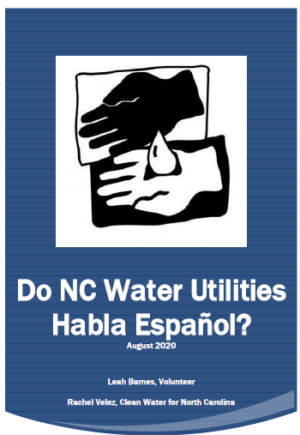
Do NC Water Utilities Habla Espanol? (2020)
By Lee Barnes & Rachel Velez
North Carolina is home to over 1 million Hispanic/LatinX inhabitants.
Community members should not be left out from receiving vital health information regarding their drinking water because they do not speak English. To strengthen how North Carolina ensures non-English speaking communities are receiving critical information about their drinking water, this report will be shared and discussed with the North Carolina Department of Environmental Quality’s Public Water Supply section. CWFNC hopes to work with the agency to take the necessary steps to ensure all community members receive equitable access to information about their drinking water.
Working Towards Water Justice in North Carolina Mobile Home Parks (2019)
By Elizabeth Allen
Many people across the United States who struggle to find affordable housing turn to mobile homes as less expensive and more available housing options. Unfortunately, living in mobile home parks comes with inherent challenges and vulnerabilities. Clean Water for North Carolina researched these water justice issues across the state.

Estimated Direct and Indirect Emissions from the Operation of the Atlantic Coast Pipeline (2019)
By Maria Velasco
Methane is the main component of natural gas and directly contributes to climate change as a very potent greenhouse gas.
This report aims to estimate how much methane would be emitted directly and indirectly form the operation of the ACP and the resulting climate forcing. The results of our calculations show that fugitive emissions from the supply chain of the Atlantic Coast Pipeline could increase the climate forcing by over 13% from current U.S. EPA estimates of methane emissions from U.S. natural gas infrastructure.
High Consequence Areas, Blast Zones and Public Safety Along the Atlantic Coast Pipeline (2017)
By Oshin Paranjape, Hope Taylor, and Ericka Faircloth
The ACP’s construction represents a significant Environmental Justice threat of disproportionate impact on populations of color and low income, for land disturbances and impacts to air, land and water. However, the safety impact on residents near the pipeline may constitute the greatest threat of all. This report displays maps of individual High Consequence Areas along the Pipeline’s route, showing numerous residences and businesses in the direct Blast Zone and/or Evacuation Zone of the Pipeline.
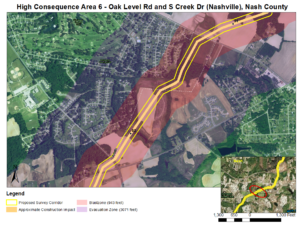
Dangerous Neighbors: Pipelines, Compressor Stations, and Environmental Justice (2016)
As natural gas continues to be touted as the transition fuel of choice, the industry’s extraction and rush to build infrastructure and its consequences have been coming under increased scrutiny. Natural gas pipelines and compressor stations are associated with specific risks and health problems, which frequently bring the most harm to low income communities and communities of color, often given little or no choice about hosting gas infrastructure in their communities.
The Stealthy Takeover of NC Drinking Water: A Snapshot of Corporate Privatization (2014)
By Katie Hicks, Sally Morgan, Jeff Harris, and Han Zhang
Executive Summary
In rural and suburban North Carolina, very small drinking water systems are common sources of household drinking water, typically drawing groundwater from one or more wells. Two profitable investor-owned corporations, Aqua America and Utilities Inc., have quietly purchased many of these systems over the past two decades. This report presents a snapshot of corporate privatization throughout North Carolina.

Natural Gas Pipelines: Regulation and Risk for North Carolina (2014)
By Ada Inda, Sally Morgan, and Hope Taylor
The natural gas pipeline system is all around us, connecting our homes, businesses, and increasingly, our power supply, to the production, processing and transportation side of the industry. But people frequently don’t understand the risks associated with the natural gas pipeline system, or what to do if a pipeline company wants to put one through your land. The report is aimed at de-mystifying the pipeline system, its regulation and opportunities for involvement by potentially impacted residents and the general public.
Privatizing NC’s Water, Undermining Justice (2011)
Executive Summary
By Katie Hicks, Hope Taylor, Siying Zhang and Mary Grant
CWFNC documents the impacts of water privatization on communities across the state, describing the growing impacts private water and sewer companies are having on water affordability, customer service, and water quality.
Blue Ridge Paper: Still Toxic After All These Years (2007) Update (June 2007)
By Hope Taylor and Gracia O’Neill (CWFNC) and Anna Slagle and Seth Smith (CWEET)
The Pigeon River, which flows from Western NC into Tennessee, has suffered from paper mill pollution since 1908. In the last decade, officials have claimed that the Pigeon River is now “clean.” Our report investigates this myth, and the answers may surprise you.
Independent Administration of Energy Efficiency Programs: A Model for North Carolina (May 2007)
Prepared for Clean Water for NC by David Nichols, Anna Sommer and William Steinhurst of Synapse Energy Economics
The administration of utility energy efficiency programs has, in certain states, been successfully accomplished by investor-owned utilities. However, in other states where utilities may have had a poor history of offering broad spectrum, aggressive energy efficiency or there was a desire to simplify programs, enhance and protect program budgets or seek relief of utility obligations as a quid pro quo, the responsibility for administration of those programs has been moved to an independent entity. The rationale for considering such a shift in responsibility is multi-fold.
Also see NC SAVE$ ENERGY legislation(H874), filed 2011
A Fairly Watered State (2006)
By Alexa Chew, Jill D. Rios and the Staff of Clean Water for North Carolina
This report examines state water allocation policy through the case study of the drought-vulnerable Yadkin-Pee Dee river basin. The effects of the 1998-2002 drought make a strong case for increased “water accountability,” changed incentives and water rate structures, and adoption of use reduction and conservation strategies throughout NC.
Achieving Environmental Justice in North Carolina Public Participation Policies (2006)
By Huei-An Chu
Public participation is critical to achieving environmental justice, as many injustices neglected by policy-making can be noted and considered early in any decision-making. Public notice and participation requirements are mandated in various environmental laws, at both federal and state levels. Many compliance guidances, program and policy tools have also been developed to enhance public participation.
Chemical Security in North Carolina (2005)
By Bill McCloy
An introduction to the policies and federal and state agencies dealing with chemical security and emergency planning. Learn about your Local Emergency Planning Committee (LPEC) and how to get involved.
Unequal Water Justice? Well Contamination Among Diverse Communities (2004)
By Kelli Reed
In an effort to strengthen environmental justice regarding North Carolina’s drinking water, this study aims to compare the experiences of communities of varied socioeconomic and ethnic backgrounds when faced with groundwater contamination incidents. It concludes that the degree to which low income and minority residents are negatively impacted, combined with the lack of notification, and inferior efforts for the provision of a clean water supply represent significant environmental justice concerns.
Keeping the Promise…or Down the Drain? (2002)
A status report on the 30th anniversary of the Clean Water Act – how far have we come?
A River in Jeopardy (2002)
By Brad Carpenter, Scott Jackson, and Hope Taylor
The Yadkin-Pee Dee River Basin has faced numerous problems, including population growth and sprawl, sediment, nutrient runoff, and toxic substances. This report examines the threats and makes recommendations for the basin.



